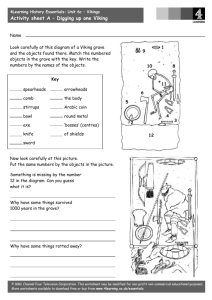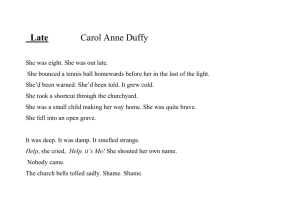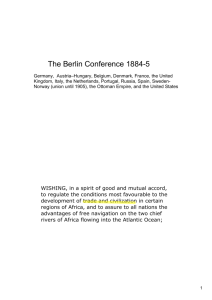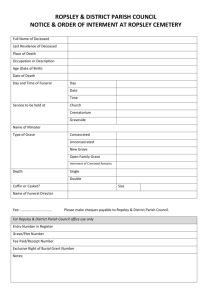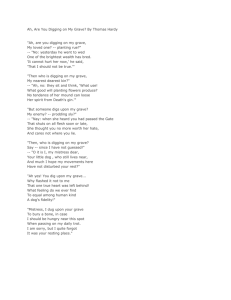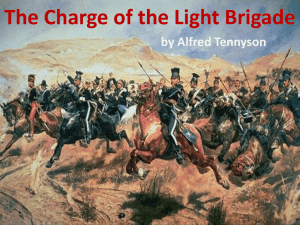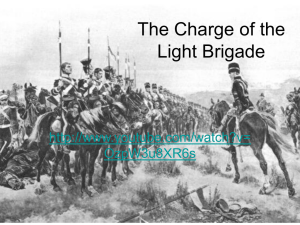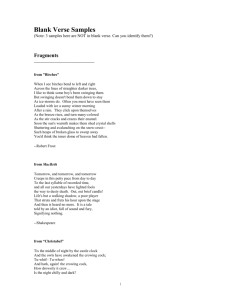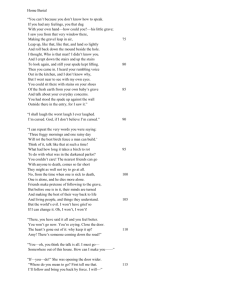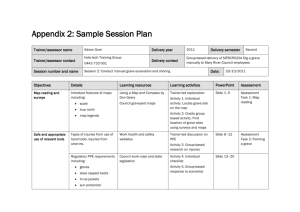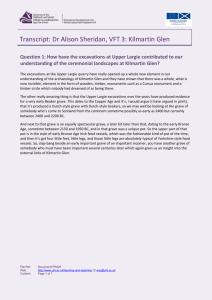VICTORIAN ERA packet
advertisement
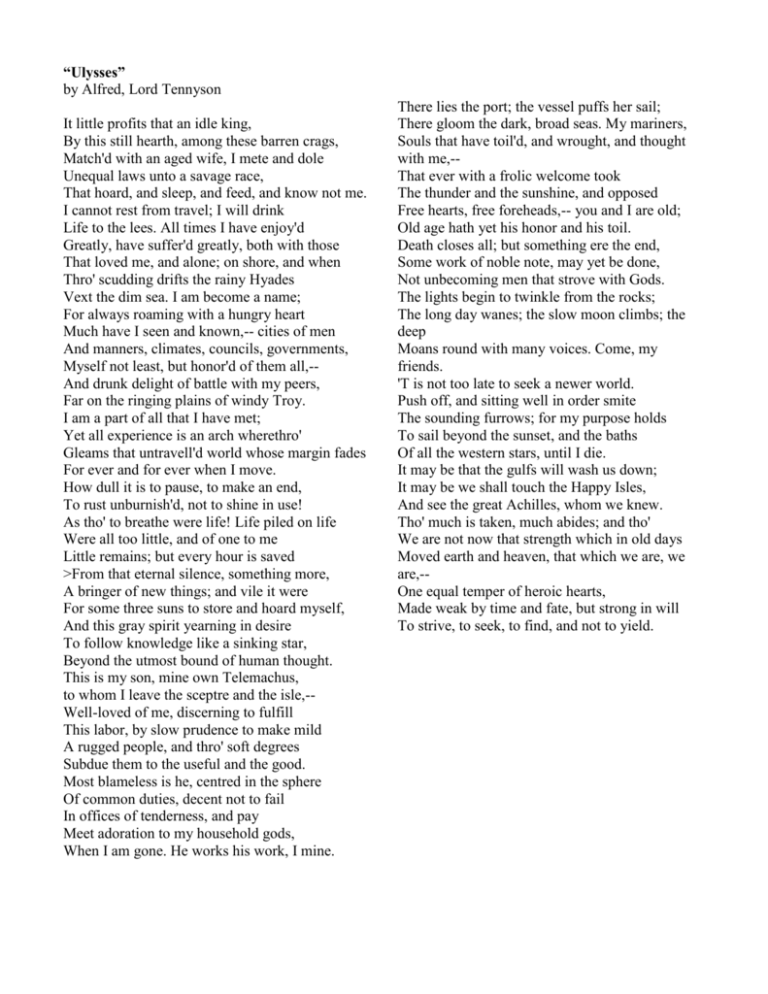
“Ulysses” by Alfred, Lord Tennyson It little profits that an idle king, By this still hearth, among these barren crags, Match'd with an aged wife, I mete and dole Unequal laws unto a savage race, That hoard, and sleep, and feed, and know not me. I cannot rest from travel; I will drink Life to the lees. All times I have enjoy'd Greatly, have suffer'd greatly, both with those That loved me, and alone; on shore, and when Thro' scudding drifts the rainy Hyades Vext the dim sea. I am become a name; For always roaming with a hungry heart Much have I seen and known,-- cities of men And manners, climates, councils, governments, Myself not least, but honor'd of them all,-And drunk delight of battle with my peers, Far on the ringing plains of windy Troy. I am a part of all that I have met; Yet all experience is an arch wherethro' Gleams that untravell'd world whose margin fades For ever and for ever when I move. How dull it is to pause, to make an end, To rust unburnish'd, not to shine in use! As tho' to breathe were life! Life piled on life Were all too little, and of one to me Little remains; but every hour is saved >From that eternal silence, something more, A bringer of new things; and vile it were For some three suns to store and hoard myself, And this gray spirit yearning in desire To follow knowledge like a sinking star, Beyond the utmost bound of human thought. This is my son, mine own Telemachus, to whom I leave the sceptre and the isle,-Well-loved of me, discerning to fulfill This labor, by slow prudence to make mild A rugged people, and thro' soft degrees Subdue them to the useful and the good. Most blameless is he, centred in the sphere Of common duties, decent not to fail In offices of tenderness, and pay Meet adoration to my household gods, When I am gone. He works his work, I mine. There lies the port; the vessel puffs her sail; There gloom the dark, broad seas. My mariners, Souls that have toil'd, and wrought, and thought with me,-That ever with a frolic welcome took The thunder and the sunshine, and opposed Free hearts, free foreheads,-- you and I are old; Old age hath yet his honor and his toil. Death closes all; but something ere the end, Some work of noble note, may yet be done, Not unbecoming men that strove with Gods. The lights begin to twinkle from the rocks; The long day wanes; the slow moon climbs; the deep Moans round with many voices. Come, my friends. 'T is not too late to seek a newer world. Push off, and sitting well in order smite The sounding furrows; for my purpose holds To sail beyond the sunset, and the baths Of all the western stars, until I die. It may be that the gulfs will wash us down; It may be we shall touch the Happy Isles, And see the great Achilles, whom we knew. Tho' much is taken, much abides; and tho' We are not now that strength which in old days Moved earth and heaven, that which we are, we are,-One equal temper of heroic hearts, Made weak by time and fate, but strong in will To strive, to seek, to find, and not to yield. “Charge of the Light Brigade” by Alfred, Lord Tennyson Half a league, half a league, Half a league onward, All in the valley of Death Rode the six hundred. 'Forward, the Light Brigade! Charge for the guns! ' he said: Into the valley of Death Rode the six hundred. 'Forward, the Light Brigade! ' Was there a man dismay'd? Not tho' the soldier knew Some one had blunder'd: Their's not to make reply, Their's not to reason why, Their's but to do and die: Into the valley of Death Rode the six hundred. Cannon to right of them, Cannon to left of them, Cannon in front of them Volley'd and thunder'd; Storm'd at with shot and shell, Boldly they rode and well, Into the jaws of Death, Into the mouth of Hell Rode the six hundred. Flash'd all their sabres bare, Flash'd as they turn'd in air Sabring the gunners there, Charging an army, while All the world wonder'd: Plunged in the battery-smoke Right thro' the line they broke; Cossack and Russian Reel'd from the sabre-stroke Shatter'd and sunder'd. Then they rode back, but not Not the six hundred. Cannon to right of them, Cannon to left of them, Cannon behind them Volley'd and thunder'd; Storm'd at with shot and shell, While horse and hero fell, They that had fought so well Came thro' the jaws of Death, Back from the mouth of Hell, All that was left of them, Left of six hundred. When can their glory fade? O the wild charge they made! All the world wonder'd. Honour the charge they made! Honour the Light Brigade, Noble six hundred! “Porphyria's Lover” by Robert Browning The rain set early in to-night, The sullen wind was soon awake, It tore the elm-tops down for spite, And did its worst to vex the lake: I listened with heart fit to break. When glided in Porphyria; straight She shut the cold out and the storm, And kneeled and made the cheerless grate Blaze up, and all the cottage warm; Which done, she rose, and from her form Withdrew the dripping cloak and shawl, And laid her soiled gloves by, untied Her hat and let the damp hair fall, And, last, she sat down by my side And called me. When no voice replied, She put my arm about her waist, And made her smooth white shoulder bare, And all her yellow hair displaced, And, stooping, made my cheek lie there, And spread, o'er all, her yellow hair, Murmuring how she loved me---she Too weak, for all her heart's endeavour, To set its struggling passion free From pride, and vainer ties dissever, And give herself to me for ever. But passion sometimes would prevail, Nor could to-night's gay feast restrain A sudden thought of one so pale For love of her, and all in vain: So, she was come through wind and rain. Be sure I looked up at her eyes Happy and proud; at last I knew Porphyria worshipped me; surprise Made my heart swell, and still it grew While I debated what to do. That moment she was mine, mine, fair, Perfectly pure and good: I found A thing to do, and all her hair In one long yellow string I wound Three times her little throat around, And strangled her. No pain felt she; I am quite sure she felt no pain. As a shut bud that holds a bee, I warily oped her lids: again Laughed the blue eyes without a stain. And I untightened next the tress About her neck; her cheek once more Blushed bright beneath my burning kiss: I propped her head up as before, Only, this time my shoulder bore Her head, which droops upon it still: The smiling rosy little head, So glad it has its utmost will, That all it scorned at once is fled, And I, its love, am gained instead! Porphyria's love: she guessed not how Her darling one wish would be heard. And thus we sit together now, And all night long we have not stirred, And yet God has not said a word! “My Last Duchess” by Robert Browning FERRARA. That's my last Duchess painted on the wall, Looking as if she were alive. I call That piece a wonder, now: Fr Pandolf's hands Worked busily a day, and there she stands. Will't please you sit and look at her? I said ``Fr Pandolf'' by design, for never read Strangers like you that pictured countenance, The depth and passion of its earnest glance, But to myself they turned (since none puts by The curtain I have drawn for you, but I) And seemed as they would ask me, if they durst, How such a glance came there; so, not the first Are you to turn and ask thus. Sir, 'twas not Her husband's presence only, called that spot Of joy into the Duchess' cheek: perhaps Fr Pandolf chanced to say ``Her mantle laps ``Over my lady's wrist too much,'' or ``Paint ``Must never hope to reproduce the faint ``Half-flush that dies along her throat:'' such stuff Was courtesy, she thought, and cause enough For calling up that spot of joy. She had A heart---how shall I say?---too soon made glad, Too easily impressed; she liked whate'er She looked on, and her looks went everywhere. Sir, 'twas all one! My favour at her breast, The dropping of the daylight in the West, The bough of cherries some officious fool Broke in the orchard for her, the white mule She rode with round the terrace---all and each Would draw from her alike the approving speech, Or blush, at least. She thanked men,---good! but thanked Somehow---I know not how---as if she ranked My gift of a nine-hundred-years-old name With anybody's gift. Who'd stoop to blame This sort of trifling? Even had you skill In speech---(which I have not)---to make your will Quite clear to such an one, and say, ``Just this ``Or that in you disgusts me; here you miss, ``Or there exceed the mark''---and if she let Herself be lessoned so, nor plainly set Her wits to yours, forsooth, and made excuse, ---E'en then would be some stooping; and I choose Never to stoop. Oh sir, she smiled, no doubt, Whene'er I passed her; but who passed without Much the same smile? This grew; I gave commands; Then all smiles stopped together. There she stands As if alive. Will't please you rise? We'll meet The company below, then. I repeat, The Count your master's known munificence Is ample warrant that no just pretence Of mine for dowry will be disallowed; Though his fair daughter's self, as I avowed At starting, is my object. Nay, we'll go Together down, sir. Notice Neptune, though, Taming a sea-horse, thought a rarity, Which Claus of Innsbruck cast in bronze for me! “The Recessional” by Rudyard Kipling “If---” by Rudyard Kipling 1897 If you can keep your head when all about you Are losing theirs and blaming it on you; If you can trust yourself when all men doubt you, But make allowance for their doubting too: If you can wait and not be tired by waiting, Or, being lied about, don't deal in lies, Or being hated don't give way to hating, And yet don't look too good, nor talk too wise; God of our fathers, known of old, Lord of our far-flung battle-line, Beneath whose awful Hand we hold Dominion over palm and pine— Lord God of Hosts, be with us yet, Lest we forget—lest we forget! The tumult and the shouting dies; The Captains and the Kings depart: Still stands Thine ancient sacrifice, An humble and a contrite heart. Lord God of Hosts, be with us yet, Lest we forget—lest we forget! Far-called, our navies melt away; On dune and headland sinks the fire: Lo, all our pomp of yesterday Is one with Nineveh and Tyre! Judge of the Nations, spare us yet, Lest we forget—lest we forget! If, drunk with sight of power, we loose Wild tongues that have not Thee in awe, Such boastings as the Gentiles use, Or lesser breeds without the Law— Lord God of Hosts, be with us yet, Lest we forget—lest we forget! For heathen heart that puts her trust In reeking tube and iron shard, All valiant dust that builds on dust, And guarding, calls not Thee to guard, For frantic boast and foolish word— Thy mercy on Thy People, Lord! If you can dream---and not make dreams your master; If you can think---and not make thoughts your aim, If you can meet with Triumph and Disaster And treat those two impostors just the same:. If you can bear to hear the truth you've spoken Twisted by knaves to make a trap for fools, Or watch the things you gave your life to, broken, And stoop and build'em up with worn-out tools; If you can make one heap of all your winnings And risk it on one turn of pitch-and-toss, And lose, and start again at your beginnings, And never breathe a word about your loss: If you can force your heart and nerve and sinew To serve your turn long after they are gone, And so hold on when there is nothing in you Except the Will which says to them: "Hold on!" If you can talk with crowds and keep your virtue, Or walk with Kings---nor lose the common touch, If neither foes nor loving friends can hurt you, If all men count with you, but none too much: If you can fill the unforgiving minute With sixty seconds' worth of distance run, Yours is the Earth and everything that's in it, And---which is more---you'll be a Man, my son! “Invictus” by William Ernest Henley Out of the night that covers me, Black as the Pit from pole to pole, I thank whatever gods may be For my unconquerable soul. In the fell clutch of circumstance I have not winced nor cried aloud. Under the bludgeonings of chance My head is bloody, but unbowed. Beyond this place of wrath and tears Looms but the Horror of the shade, And yet the menace of the years Finds, and shall find, me unafraid. It matters not how strait the gate, How charged with punishments the scroll. I am the master of my fate: I am the captain of my soul. “I Am The Reaper” by William Ernest Henley I am the Reaper. All things with heedful hook Silent I gather. Pale roses touched with the spring, Tall corn in summer, Fruits rich with autumn, and frail winter blossoms— Reaping, still reaping— All things with heedful hook Timely I gather. I am the Sower. All the unbodied life Runs through my seed-sheet. Atom with atom wed, Each quickening the other, Fall through my hands, ever changing, still changeless. Ceaselessly sowing, Life, incorruptible life, Flows from my seed-sheet. Maker and breaker, I am the ebb and the flood, Here and Hereafter, Sped through the tangle and coil Of infinite nature, Viewless and soundless I fashion all being. Taker and giver, I am the womb and the grave, The Now and the Ever “There's A Regret” by William Ernest Henley There's a regret So grinding, so immitigably sad, Remorse thereby feels tolerant, even glad. ... Do you not know it yet? For deeds undone Rankle and snarl and hunger for their due, Till there seems naught so despicable as you In all the grin o' the sun. Like an old shoe The sea spurns and the land abhors, you lie About the beach of Time, till by and by Death, that derides you too -Death, as he goes His ragman's round, espies you, where you stray, With half-an-eye, and kicks you out of his way And then -- and then, who knows But the kind Grave Turns on you, and you feel the convict Worm, In that black bridewell working out his term, Hanker and grope and crave? "Poor fool that might -That might, yet would not, dared not, let this be, Think of it, here and thus made over to me In the implacable night!" And writhing, fain And like a triumphing lover, he shall take, His fill where no high memory lives to make His obscene victory vain. “Are You Digging Upon My Grave?” by Thomas Hardy “A Meeting with Despair” by Thomas Hardy "Ah, are you digging on my grave, My loved one? -- planting rue?" -- "No: yesterday he went to wed One of the brightest wealth has bred. 'It cannot hurt her now,' he said, 'That I should not be true.'" As evening shaped I found me on a moor Which sight could scarce sustain: The black lean land, of featureless contour, Was like a tract in pain. "Then who is digging on my grave, My nearest dearest kin?" -- "Ah, no: they sit and think, 'What use! What good will planting flowers produce? No tendance of her mound can loose Her spirit from Death's gin.'" "But someone digs upon my grave? My enemy? -- prodding sly?" -- "Nay: when she heard you had passed the Gate That shuts on all flesh soon or late, She thought you no more worth her hate, And cares not where you lie. "Then, who is digging on my grave? Say -- since I have not guessed!" -- "O it is I, my mistress dear, Your little dog , who still lives near, And much I hope my movements here Have not disturbed your rest?" "Ah yes! You dig upon my grave... Why flashed it not to me That one true heart was left behind! What feeling do we ever find To equal among human kind A dog's fidelity!" "Mistress, I dug upon your grave To bury a bone, in case I should be hungry near this spot When passing on my daily trot. I am sorry, but I quite forgot It was your resting place." "This scene, like my own life," I said, "is one Where many glooms abide; Toned by its fortune to a deadly dun-Lightless on every side. I glanced aloft and halted, pleasure-caught To see the contrast there: The ray-lit clouds gleamed glory; and I thought, "There's solace everywhere!" Then bitter self-reproaches as I stood I dealt me silently As one perverse--misrepresenting Good In graceless mutiny. Against the horizon's dim-descernèd wheel A form rose, strange of mould: That he was hideous, hopeless, I could feel Rather than could behold. "'Tis a dead spot, where even the light lies spent To darkness!" croaked the Thing. "Not if you look aloft!" said I, intent On my new reasoning. "Yea--but await awhile!" he cried. "Ho-ho!-Look now aloft and see!" I looked. There, too, sat night: Heaven's radiant show Had gone. Then chuckled he.

